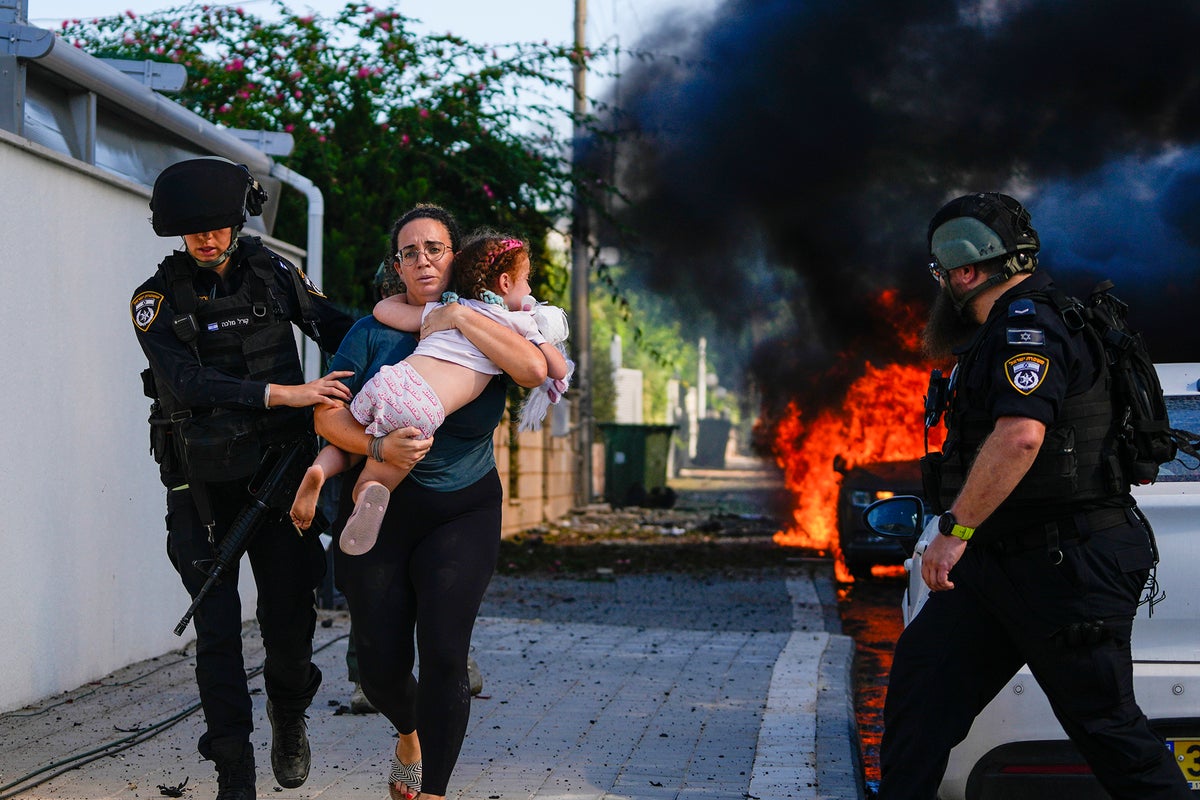Donald Macintyre: It is unclear what Hamas will achieve by this carnage


There have been many signs in recent years that the world’s preoccupation with global dangers ranging from climate change to the war in Ukraine has left it increasingly jaundiced by regular reports of the conflict between Israel and the Palestinians.
But it would be a spectacular error to think that events precipitated from Gaza in the early hours of Saturday morning are somehow merely “more of the same”.
While the estimated figure of 2,200-2,500 rocket attacks from the Strip in a few hours is high, there have been plenty of such attacks in the past.
But the unexpected large-scale infiltration of armed militants of Hamas and Islamic Jihad into the heart of southern Israeli communities killing, wounding and abducting civilians as well as soldiers is profoundly ominous. In fact, it has not happened since long before the second intifada of 2000 to 2004 or in any of the four lethal Gaza wars this century.
Many details of the unfolding events are still unclear.
In time no doubt there will be an internal inquiry in Israel into how its supremely sophisticated intelligence service failed to see the operation coming on the last day of the Jewish Sukkot holiday.
Or how its military failed to prevent the militant units – apparently directed by Mohammed Deif, the Hamas military leader severely wounded and almost killed by the Israelis in 2006 – from passing out of the famously well-fortified coastal enclave in which some two million Palestinians are imprisoned.
But that will do little to answer the question of what Hamas, as the dominant faction inside Gaza, thinks this unprecedented carnage will achieve.
It’s all too easy of course to reel off the genuine grievances of ordinary Palestinians that Hamas can claim to be responding to. These include the long siege of Gaza which has all but demolished its internal economy and the recent block, in response to demonstrations along the border separation barrier, on up to 20,000 people being allowed out each day to work in Israel.
There has been a serious spike in violence in the occupied West Bank – on both sides, but seriously fuelled by growing aggressiveness often with tacit acceptance by the Army – against their Palestinian neighbours by the Jewish residents of settlements judged by most Western governments to be illegal in international law.
Israeli forces targeted Gaza in retaliation for the surprise attack by Hamas leaders on Saturday
( )
And the one most frequently claimed by Hamas leaders this weekend – the “desecration” of Jerusalem’s Al-Aqsa mosque by hard-right Israel settlers choosing to pray in its vicinity. Palestinians see this as a violation of the delicately maintained status quo around the mosque compound, which Arabs know as Haram al-Sharif and Jews as the Temple Mount.
Perhaps Hamas felt goaded by what Iranian backed rival faction Islamic Jihad (and some of its own militants) said about its apparent inaction over these rapidly worsening conditions for Palestinians.
But none of that fully explains – nor in the eyes of many of the Palestinians’ friends as well as their enemies justifies – the escalation of its modus operandi to the ground onslaught on southern Israeli communities that began yesterday.
Especially as the war now declared by Netanyahu will put, indeed is already putting, the lives of unknowable numbers of civilian Palestinians in Gaza at risk with even a ground invasion of the Strip, which Israel has baulked at since 2014, not necessarily ruled out.
A woman flees with a child as a car burns in the street behind – hundreds have been died in Saturday’s attacks
( )
A driver in Gaza I have known for 20 years telephoned me and said: “Everyone is afraid in Gaza. No one knows what is going to happen.”
It may be that Hamas concluded that with Israel riven by internal dissention over the efforts by the most right-wing government in its history to neuter its supreme court, the country had weakened to a point which gave it the opportunity to strike.
And certainly some of the intelligence failures which it has been able to exploit may result from the country’s internal distractions.
The problem, however, with that argument is that the extreme-right ultranationalist politicians inside, and to a large extent, driving Netanyahu’s coalition, will be among those clamouring for the most extreme measures against Gaza.
Moreover, as Saturday’s demonstrations against the supreme court overhaul were called off, army reservists who had withheld their service in protest began to return for duty in a demonstration of national unity.
It may be too that that the dozens of Israeli hostages the armed factions are now reported to be holding inside Gaza – like the frightened woman shown in the unauthenticated but plausible-looking video under armed guard in a Gaza street – may deter Israel from a full-scale onslaught on the Strip. But as of now that seems a far from bankable proposition.
Israel’s defence minister Yoav Gallant said on Saturday that Hamas had made a “big mistake”. This sounds like routine Israeli rhetoric familiar from many other conflicts with Gaza.
Events over the coming days, even hours, are almost impossible to predict. But as of now it would be rash to assume that this time Gallant has got that wrong.
Donald Macintyre is the author of “Gaza: Preparing for Dawn”
xnxx,
xvideos,
porn,
porn,
xnxx,
Phim sex,
mp3 download,
sex 4K,
Straka Pga,
gay teen porn,
Hentai haven,
free Hentai,
xnxx,
xvideos,
porn,
porn,
xnxx,
Phim sex,
mp3 download,
sex 4K,
Straka Pga,
gay teen porn,
Hentai haven,
free Hentai,




